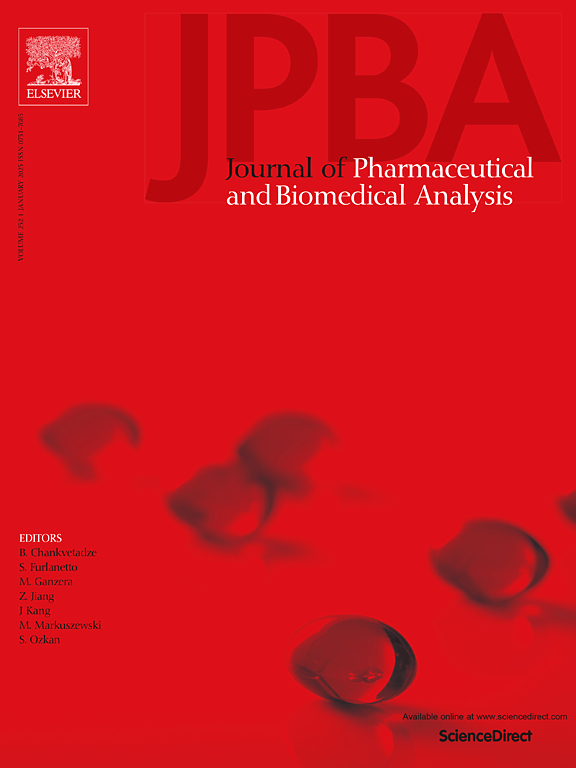补充蒺藜对尿类固醇谱的影响:一项短期试点研究
IF 3.1
3区 医学
Q2 CHEMISTRY, ANALYTICAL
Journal of pharmaceutical and biomedical analysis
Pub Date : 2025-09-24
DOI:10.1016/j.jpba.2025.117160
引用次数: 0
摘要
类固醇代谢是一个复杂的生化过程,易受外源化合物的调节。蒺藜(TT)是一种广泛使用的草药补充剂,因其据称的人体代谢和合成代谢作用而上市。这项初步调查旨在评估短期补充TT对尿类固醇谱的影响。在两个月的时间里,从8名男性和7名女性休闲运动员中获得尿液样本,这些运动员宣布每天服用TT提取物。采用气相色谱-串联质谱(GC-MS /MS)方法定量测定5α-雄烷-3α、17β-二醇、5β-雄烷-3α、5β-雄烷-3α、5β-雄烷-3α、17β-二醇、11β-羟基雄酮、11β-羟基胆甾醇、二氢睾酮、5α-雄烷-3,17-二酮、表甾酮、睾酮、4-雄烷-3,17-二酮浓度及代谢率。在男性休闲运动员中,观察到4-雄烯-3、17-二酮、表甾酮和睾酮的时间依赖性增加;然而,在补充TT提取物之前和期间收集的尿液样本之间没有统计学上的显著差异。在女性参与者中,检测到所有测量的类固醇特征标记物的初始增加随后下降,但与男性队列相似,在TT补充之前和期间收集的样本之间没有发现统计学上的显着差异。尽管尿中类固醇浓度存在显著的个体间差异,但在补充前后,没有观察到类固醇谱和比例的统计学显著变化。虽然样本量小,但这些试点数据表明,在本研究条件下,短期补充TT不会引起尿类固醇激素谱的可测量变化,也不太可能干扰内源性类固醇激素的转换。因此,这些发现对TT作为一种性能增强剂的功效提出了质疑,并强调了对更广泛的TT消费者群体进行更长时间的进一步机制研究的必要性。本文章由计算机程序翻译,如有差异,请以英文原文为准。
Impact of Tribulus terrestris supplementation on urinary steroid profiles: A short term pilot study
Steroid metabolism is a complex biochemical process susceptible to modulation by exogenous compounds. Tribulus terrestris (TT) is a widely used herbal supplement marketed for its purported ergogenic and anabolic effects. This preliminary investigation aimed to assess the impact of short-term TT supplementation on urinary steroid profiles. Urine samples were obtained over a two-month period from eight male and seven female recreational athletes declaring to daily consume a TT extract. 5α-androstane-3α,17β-diol, 5β-androstane-3α,17β-diol, androsterone, etiocholanolone, 11β-hydroxyandrosterone, 11β-hydroxyetiocholanolone, dihidrotestosterone, 5alpha-Androstane-3,17-dione, epitestosterone, testosterone, 4-androstene-3,17-dione concentrations, along with metabolic ratios, were quantified using a validated gas chromatography–tandem mass spectrometry (GC–MS/MS) methodology. In male recreational athletes, time-dependent increases in 4-androstene-3,17-dione, epitestosterone and testosterone were observed; however, no statistically significant differences were detected between urine samples collected before and during TT extract supplementation. In female participants, an initial increase followed by a subsequent decrease in all measured steroid profile markers was detected, but similarly to the male cohort, no statistically significant differences were identified between samples collected before and during TT supplementation. Despite considerable inter-individual variability in urinary steroid concentrations, no statistically significant alterations in steroid profiles and ratios were observed pre-versus post-supplementation. Although derived from a small sample size, these pilot data suggest that short–term TT supplementation does not elicit measurable changes in urinary steroid hormone profiles under the conditions of this study and is unlikely to interfere with endogenous steroid hormones turnover. Consequently, these findings raise questions the efficacy of TT as a performance-enhancing agent and underscore the necessity for further mechanistic studies on a broader cohort of TT consumers for a larger period of time.
求助全文
通过发布文献求助,成功后即可免费获取论文全文。
去求助
来源期刊
CiteScore
6.70
自引率
5.90%
发文量
588
审稿时长
37 days
期刊介绍:
This journal is an international medium directed towards the needs of academic, clinical, government and industrial analysis by publishing original research reports and critical reviews on pharmaceutical and biomedical analysis. It covers the interdisciplinary aspects of analysis in the pharmaceutical, biomedical and clinical sciences, including developments in analytical methodology, instrumentation, computation and interpretation. Submissions on novel applications focusing on drug purity and stability studies, pharmacokinetics, therapeutic monitoring, metabolic profiling; drug-related aspects of analytical biochemistry and forensic toxicology; quality assurance in the pharmaceutical industry are also welcome.
Studies from areas of well established and poorly selective methods, such as UV-VIS spectrophotometry (including derivative and multi-wavelength measurements), basic electroanalytical (potentiometric, polarographic and voltammetric) methods, fluorimetry, flow-injection analysis, etc. are accepted for publication in exceptional cases only, if a unique and substantial advantage over presently known systems is demonstrated. The same applies to the assay of simple drug formulations by any kind of methods and the determination of drugs in biological samples based merely on spiked samples. Drug purity/stability studies should contain information on the structure elucidation of the impurities/degradants.

 求助内容:
求助内容: 应助结果提醒方式:
应助结果提醒方式:


